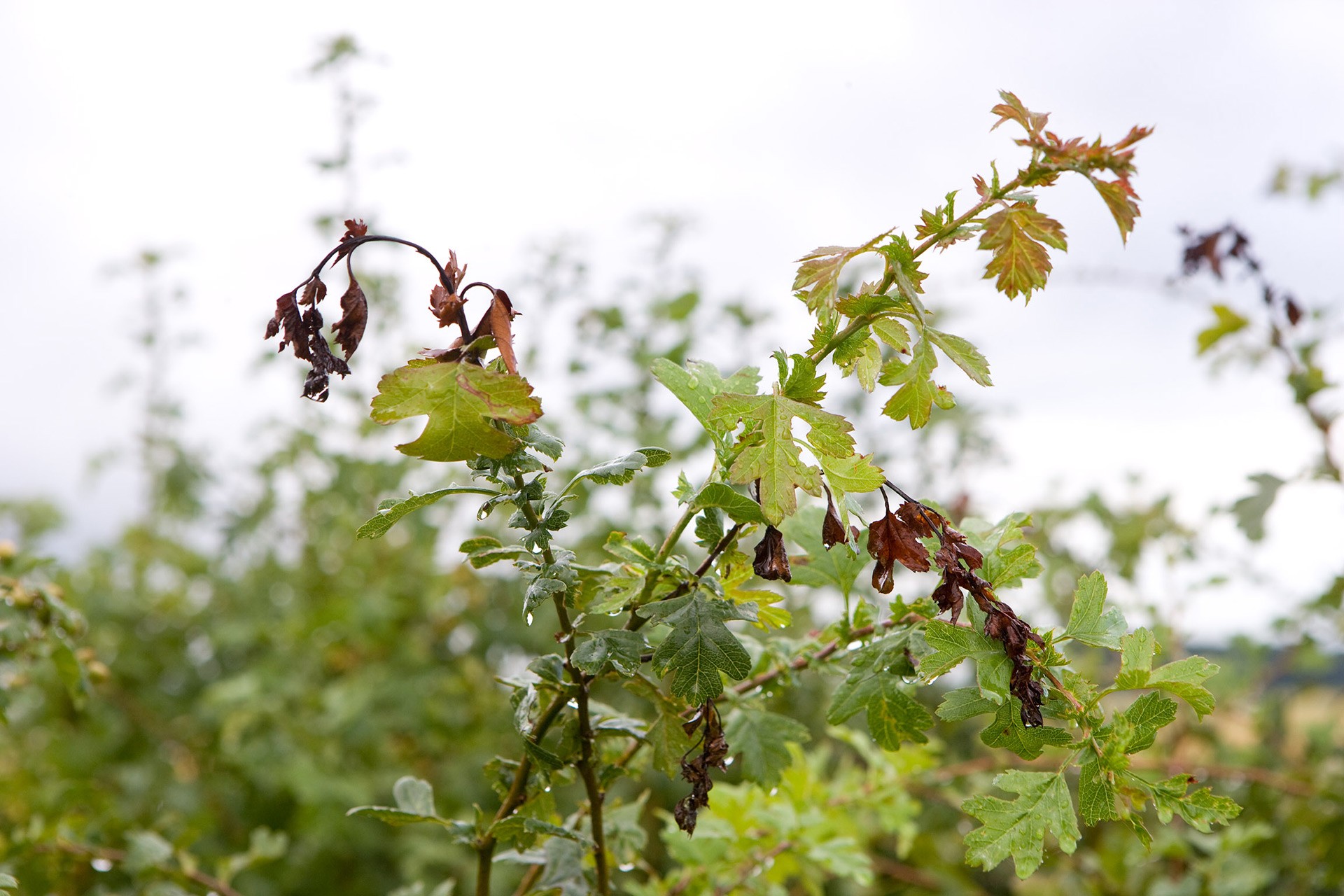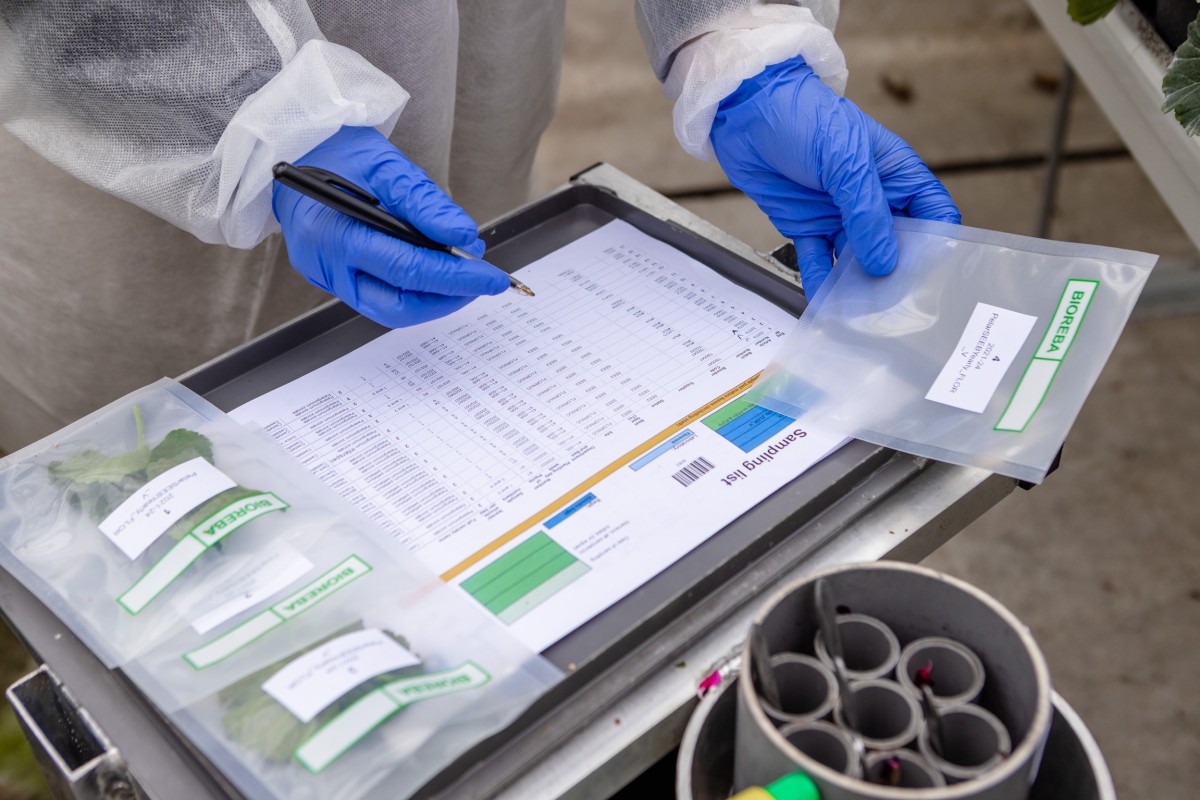We inspect plant material for quality, identity and health (pests and diseases). We examine the administrative records, company hygiene, the company's own quality inspections and the traceability of products. We also perform inspections of imports and exports of plant material on behalf of the NVWA. This enables entrepreneurs in the horticultural sector to trade their healthy plant material worldwide.
Company inspections optimise processes
In 2024, we prepared to introduce a new inspection programme. This improves process analyses, saves costs and supports inspectors with digital tools, such as interactive inspection maps. The new inspection programme will be applied from mid-March 2025.
Our inspectors will be supported digitally in the field, for example with overview maps of the area to be inspected. These maps are also used for fire blight inspections, among other things. The digital map layers include, for example, the buffer zones, the plots to be inspected, any samples taken and any infections. In 2024, we made preparations to improve these map layers so that inspectors are better equipped to perform their tasks.
New Planning system for import and export inspections
In 2024, we worked on a new, automated planning system. This system links inspections to inspectors based on historical data and the expected travel times. In effect, this means that the system automatically links the majority of import and export inspections to a certain inspector. The only actions manually processed by the planners are the exceptions and calamities. Their main task is monitoring the planning. As a result, we have boosted efficiency and reduces costs for companies. The new system will apply from early 2025.
Additional inspections commissioned by the NVWA
The NVWA is tasked with responsibility for monitoring quarantine organisms (Q). The BKD, KCB, NAK and Naktuinbouw have been mandated by the NVWA to perform the actual inspections and testing. If quarantine organisms are detected, the NVWA is responsible for taking further action. Naktuinbouw provides support where possible. We monitor the phytosanitary status in the Netherlands for a number of specific organisms on behalf of the NVWA. We examine a number of specific crops for the presence of quarantine organisms, or potential organisms worthy of classification as QO. In 2024, a Q organism was found twice during the monitoring.
We also perform an annual inspection of companies that import crops with a high risk of quarantine organisms on behalf of the NVWA. This inspection is important as some pests and diseases only become visible a few weeks after the material has been imported. In 2024, the insect Scirtothrips dorsalis was found in Jasmine plants during this inspection. The NVWA performed further inspections and imposed measures.
ToBRFV
In 2024, a very high number of lots of tomato and sweet pepper seeds were tested for the ToBRFV virus. Once again, high numbers of this virus were detected - especially in imported lots. At the end of 2024, the European Commission decided to change the quarantine status of the virus to RNQP because the virus is now widespread throughout the EU and eradication is no longer possible.
Fire blight
For the Raad voor de Boomkwekerij foundation for nursery stock, we performed inspection activities in fire blight-free buffer zones in the Netherlands, at nurseries, in public green spaces and at fruit growers. There were more finds of fire blight infections in 2024 than in 2023 which brings the figure back to the usual level of around 250 finds per year.
There were more infections in public green spaces, fruit growers and nurseries. The weather conditions were so favourable for the development of the bacterium that concentrated outbreaks of fire blight occurred early in the year. As a result, more infections were found throughout the season. Thanks to the inspections by Naktuinbouw, the damage remained limited and manageable. This approach helps maintain the buffer zones so that as a country, we can continue to comply with the requirements of an established zone.

Accreditation Systems
Naktuinbouw has developed various company accreditation systems that demonstrate the added value or superior quality of products.
New: HSPO
In 2024, Naktuinbouw developed a new hygiene system for plant growers: Hygiene System Plant Cultivation (HSPO). The system was developed at the request of and in cooperation with Plantum and plant growers. This hygiene system enables growers to improve hygiene on the company and possibly reduce the inspection intensity of Naktuinbouw. HSPO offers the advantages of increasing the health and quality of the plant material as well as reducing the risk of any issues or damage further along in the supply chain.
HSPO harmonises with the various other systems currently used at plant nurseries without doubling the requirements placed on growers. This includes Planet Proof, regular Naktuinbouw inspections and accreditation to permit the use of plant passports. The system can be applied for all crops and all pathogens relevant to the crops.
Elite Ornamental Crops
Naktuinbouw Elite Ornamental Crops is an accreditation system for the ornamental crops sector. There are now 21 participants worldwide who produce propagating material and perennials that are disease-free and true to variety.
Elite Pome Fruit
Naktuinbouw Elite Pome Fruit is additional to EU certification of pome fruit crops. The conditions of Naktuinbouw Elite Pome Fruit place higher standards on companies and their trees or rootstock. If all the requirements are met, the propagating material may be traded with a certificate and an Elite label. In 2024, 26 companies were authorised to use the Elite Pome Fruit label.
Elite Soft Fruit
In cooperation with the soft fruit sector, Naktuinbouw has developed an accreditation system that enables growers to demonstrate the added value and superior quality of their products. Naktuinbouw Elite Soft Fruit is additional to EU certification of fruit crops. In 2024, eight companies were authorised to use the Elite Pome Fruit label.
BOOT
The BOOT accreditation system - which stands for sampling under official supervision - is a module developed by Naktuinbouw in cooperation with the NVWA. BOOT is used for sampling of tomato and sweet pepper seeds for official tests for ToBRFV. Naktuinbouw monitors the testing activities by performing a company audit. The NVWA monitors BOOT using post control and an audit of the system. To date, six companies comply with the BOOT requirements and have BOOT accreditation.
NAFI
Naktuinbouw Authorised Field Inspection (NAFI) is a system that authorises seed companies to monitor seed production. The main focus is on compliance with various requirements relating to identity, quality and health. Three seed companies are NAFI authorised.
NAL
NAL stands for Naktuinbouw Authorised Laboratories. NAL enables participants to make the right decisions based on reliable data obtained from laboratory testing in their own laboratories. The certificates allow participants to demonstrate the health and quality of material destined for international trading. There are 20 participants worldwide. Taken together, the companies with NAL authorisation represent more than 80% of the market share in the international trade of vegetable seeds.
ASLN
Authorised Service Laboratories Naktuinbouw (ASLN) is an authorisation system aimed at laboratory testing of soil, plant material and/or seeds. The ASLN system is intended for service laboratories. At present, nine companies comply with the ASLN requirements and are ASLN authorised.
Select Plant
Naktuinbouw Select Plant is a system for lots of propagating material of extra quality. Naktuinbouw performs additional inspections, sampling and tests to demonstrate that asparagus, alstroemeria, freesia and hosta are disease-free. There are 25 participants.
Naktuinbouw Select Plant Avenue and Ornamental trees safeguards the certainty of the identity and origin of avenue and ornamental trees. There are 19 participants.
Among other things, Naktuinbouw Select Plant Plants ensures that the accredited companies produce propagating material on PCN-free plots of land. There are 100 participants.

